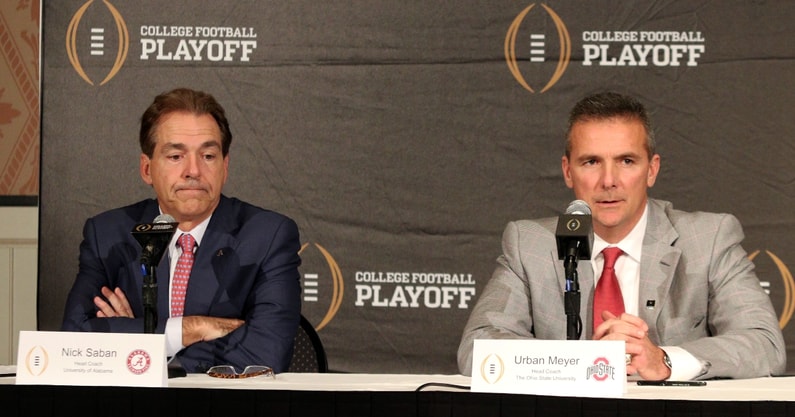Nick Saban, Urban Meyer discuss how transfer portal can affect graduation rate, life after football

Two of the greatest coaches in college football history discussed one of the most controversial topics in the sport Wednesday.
Urban Meyer, who won a combined three national championships at Florida and Ohio State, and Nick Saban, who won a combined seven national championships at LSU and Alabama, exchanged their views on the transfer portal — specifically, how the portal can affect graduation rate and life after football.
Meyer kicked off the discussion by describing himself as pretty “traditionalist” on the matter. In other words, Meyer values building a program through high school recruiting.
Meyer pointed out how Deion Sanders, a friend of both Meyer and Saban, has gone in a different direction as the head coach of Colorado, completely revamping the program with 53 transfer additions ahead of his first season at the helm last year.
“I see those numbers, and it astonishes me that you could rebuild a team, and some of those kids aren’t even showing up until July,” Meyer said on the first episode of “The Triple Option” podcast, hosted by former NFL and Alabama running back Mark Ingram II, longtime commentator Rob Stone and Meyer.
“What’s not being talked about is the residual,” Meyer said. “When I see, and I talk to high school coaches, I still have so many friends like we all do — when you see a program say, ‘I’m not going to recruit high school players.’
“People don’t realize the residual of that is those high school players might not be getting those opportunities. I’m wondering where that’s going to end up, because, at the end of the day, college football is there for a reason. It’s been there for a long time before us, and it’s going to be there a long time after us. And that’s to take young people, get them in a great environment, toughen them up, make sure academically they’re set and that they can go live life after this game’s done. That’s the world I grew up in.”
Meyer then posed the question to Saban, asking the recently-retired Crimson Tide coach what he believes the effects of the transfer portal are on the sport, including what it means for the high school athlete.
“It’s always been my philosophy, and I think yours as well, that for players that come into your program, the No. 1 goal is, ‘How can we help them be more successful in life because they were involved in the program?’ So you’re really going to college to create value for your future.
“And, as an athlete, that could be on the field, in terms of developing a career at the next level, but, most importantly, [it’s also about] preparing yourself for the day you couldn’t play football, and that means making sure you get an education.”
Top 10
- 1Breaking
ESPN, YouTube TV dispute
Blackout begins now
- 2Hot
LSU AD
Decision made on Scott Woodward
- 3Trending
Tennessee Baseball
Poaches Florida interim HC
- 4
Oklahoma-Tennessee
Playoff elimination game
- 5
Dan Lanning
Makes coaching plans clear
Get the Daily On3 Newsletter in your inbox every morning
By clicking "Subscribe to Newsletter", I agree to On3's Privacy Notice, Terms, and use of my personal information described therein.
Saban noted how proud he is of the hundreds of degrees earned by his players, both at the graduate and undergraduate level, throughout his time at Alabama. He emphasized, “that’s really what it’s all about.”
“Now, you and I coached back in the day where we didn’t have progress toward a degree rules,” Saban said to Meyer. “We could take as many hours in the summer to get eligible, and the graduation rates were not very good. And we went through probably a 25-year process of developing ways that we could make sure guys were developing careers off the field. We got to the point where we have 85% graduation rates, and we had personal development programs, mental health care — we had all these things that enhance players having the opportunity to be more successful in life.
“The one fear that I have is [that] guys being able to transfer, especially two or three times, may impact how many guys graduate. So down the road, we may have some sad stories about what happens to these players.”
Saban wonders if the transfer portal is going to further all the progress programs have made, in regard to academic advancement for players, or if it will impede that progress. He does understand, in some cases, the benefit of players transferring after two or three years at one school for an opportunity at another school.
“But when guys just do it for financial reasons, I think it’s a little short-sighted in terms of what they can develop down the road,” Saban said.
Meyer and Saban are both fearful of the long-term effects of the transfer portal, mainly for the negative impact it could have on players’ prospects for life after football.